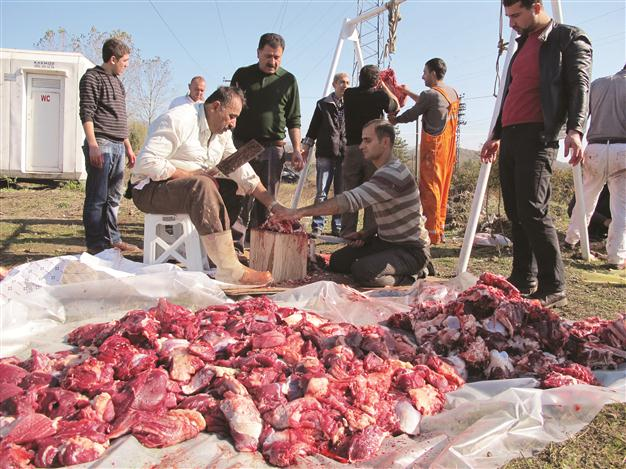Kurban Bayram: Time of sharing
WILCO VAN HERPEN - wilcovanherpen@yahoo.co.uk

The sacrificed animal is cut into pieces, the meat partitioned and the skin given away to charity.
The holidays are over and life continues as if nothing happened. It is exactly two months and 10 days ago that we celebrated the Şeker Bayram holiday (Festival of Ramadan). Now it is time to celebrate the Kurban Bayram holiday (Feast of the Sacrifice).One of the most difficult things for me about living in another country is understanding the feeling of the special religious traditions. Born and raised in the Netherlands, I know the excitement we all have for Sinterklaas, Easter, Christmas and other holidays. I would be lying if I said I feel the same excitement about Şeker Bayramı or Kurban Bayramı. The closest I can come is by imagining the feeling Christmas gives me and with that feeling celebrate the Turkish bayram. It still does not give the deeper feeling, but it is as close as I can get.
Last Sunday Kurban Bayram began, and for a lot of the foreigners here bayram is a cruel celebration. The only thing they see is thousands of animals being killed, and television makes this image stronger by showing what went wrong that day: a cow that managed to escape, people chasing the cow and the same cow outrunning those people. Sometimes the footage I saw on television was very cruel, but is this really the philosophy of bayram?
For Turkish people bayram is a day to look forward to, especially for children. This year, for the first time, I celebrated bayram with my Turkish family and relatives. I went to Ereğli to meet relatives I never had seen before. The welcome was warm, characteristic of Turkish families. We sat down, drank tea and chatted.
The next morning everybody woke up early. The men went to the mosque for the morning prayer while the women prepared breakfast. Hungry, everybody returned home where warm tea, fresh bread and a variety of cheese and jams were waiting on the table. But before we started with our breakfast, the children greeted their elders. This is the highlight of the day for all children, because after kissing the hand of the elder and putting the hand to the forehead, we, as older people, give the children money. The funny thing this morning was that some of the children were a bit confused. Should they kiss my hand? Would I give them money? How as a foreigner would I react? They were relieved when I gave each of them 50 Turkish Liras and, with a smile on their faces, they showed it to their parents.
The philosophy behind bayram nowadays is to share your “wealth” with people who cannot afford it. Of every animal that has been sacrificed, you can keep a quarter of its meat. The rest of the meat you have to give away to at least seven people.
We went to a specially prepared place in Ereğli where people could buy and slaughter their animals. It was outside Ereğli at an open place, but when I arrived I was in shock. I know the situation in the bigger cities has improved a lot the last few years, but why is it that in the rural areas of Turkey the situation is still far from perfect? My relatives had brought me to an open field that people use to dump their old tires or other things. The city council had placed a couple of toilets and water taps on the field, but that was about it. Everywhere animals were waiting for their final destiny. A buyer would come, check the animal, agree on the price and then take the animal to an empty place where someone else would kill it. Before they kill the animal someone has to read a special prayer out of the Quran and then, with one move of the knife, he kills the animal. The animal is cut into pieces, the meat partitioned and the skin given away to charity.
For us it is time to go home. With a big bag of meat we return home. The meat has to be divided, prepared and cooked. While cutting the meat, the women are singing Arabesk songs. When all the meat has been cut into small pieces, it is prepared with its own fat and cooked in its own juices. We call this “kavurma.” It is typical bayram food since it is easy and quick to prepare.
There was one more thing to do that day, and that was a visit to the graveyard. Either the day before bayram or on the holiday itself people pay a visit to their loved ones that they have lost. People pray, clean the grave, water the plants and think about “the good old times.” Our day was about to finish. We left the graveyard and went home. It had been a good bayram.
















